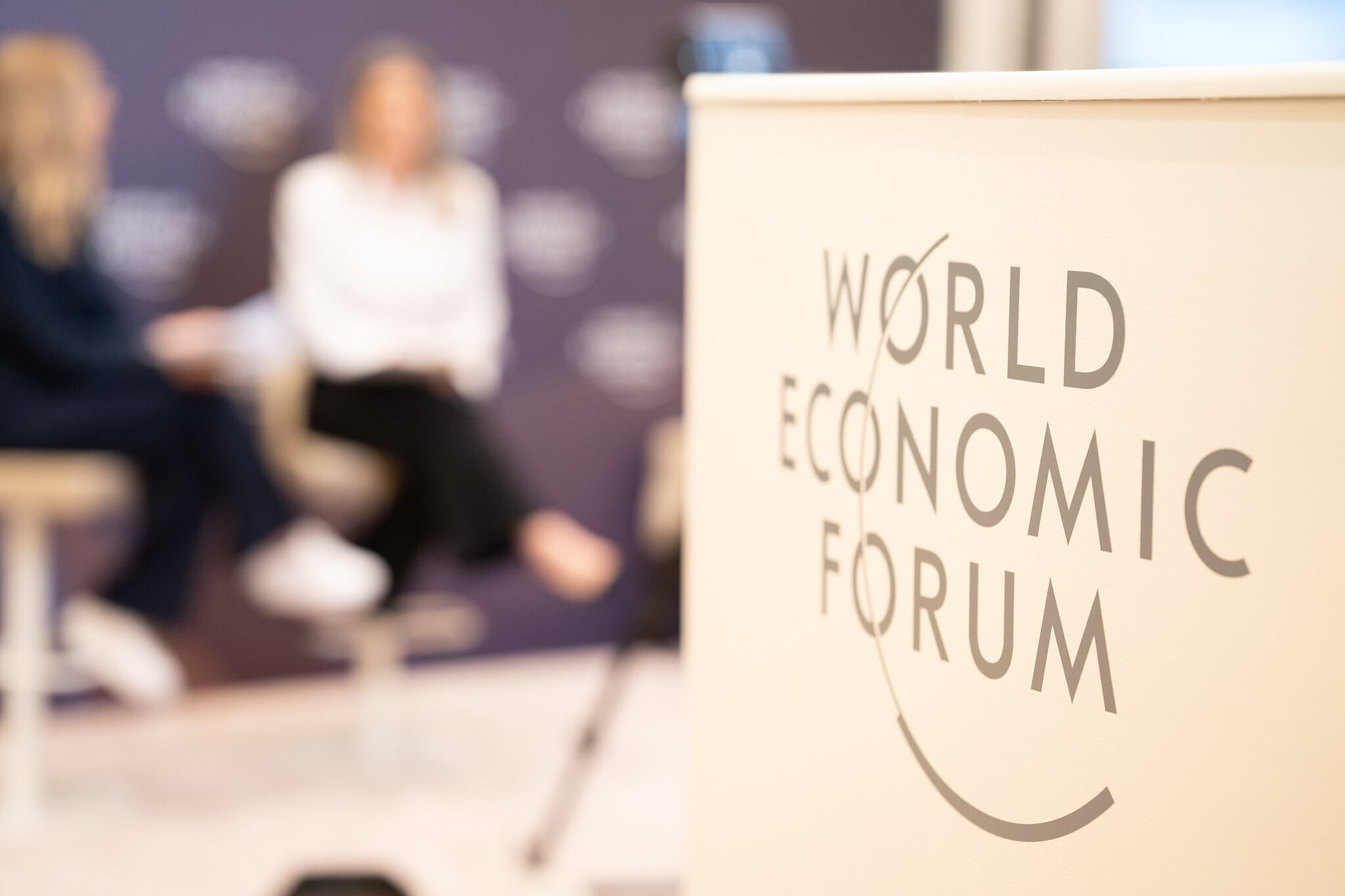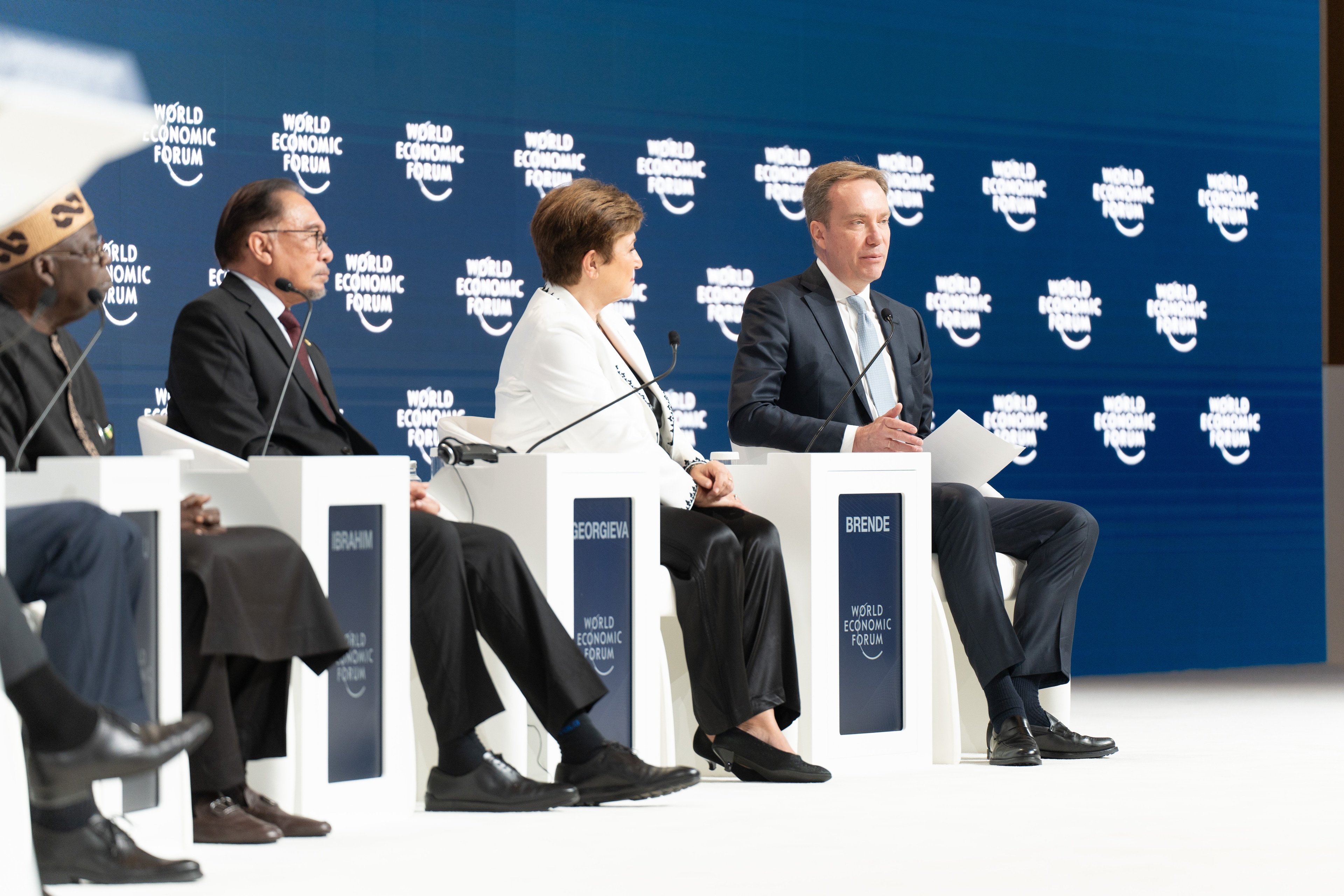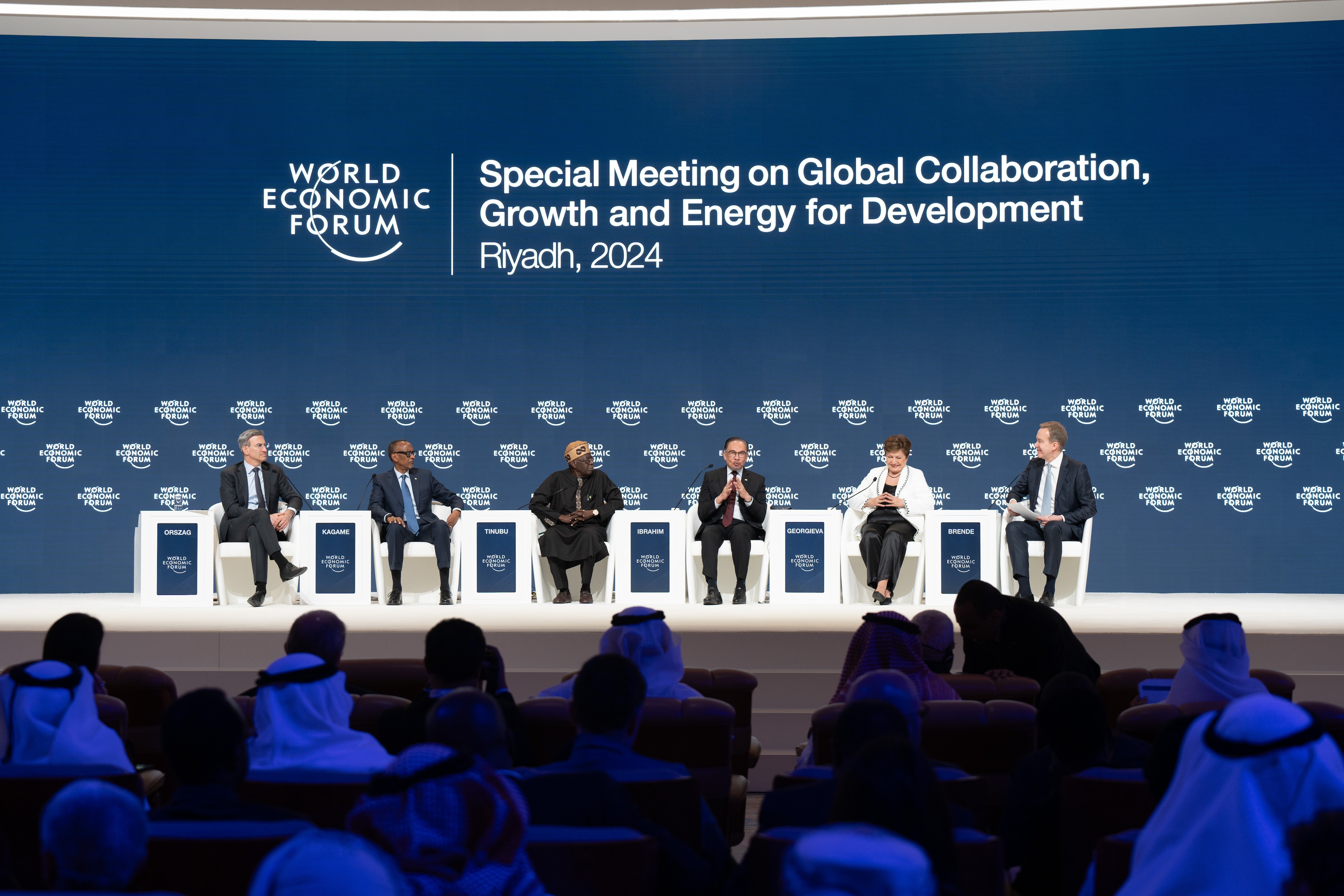Sustainable, nutritious, affordable: How an entrepreneur is empowering local food producers to feed the world

Blendhub's founder, Henrik Stamm Kristensen, discusses how the company began and his hopes for creating more social impact. Image: World Economic Forum/Blendhub

Get involved with our crowdsourced digital platform to deliver impact at scale
Stay up to date:
Davos Agenda
Listen to the article
- Food insecurity and malnutrition are growing globally, but a food production platform is taking a localized and digitally enabled approach to tackle the crisis.
- Blendhub has been selected to join the World Economic Forum's New Champions Community, which helps mission-driven mid-size organizations to grow and broaden their social impact.
- Blendhub's founder, Henrik Stamm Kristensen, discusses how the company began and his hopes for creating more social impact.
You could call Henrik Stamm Kristensen a "cereal" entrepreneur. He was just 17 when he started working for a food ingredients company in the early 1980s, and since then, he's gone on to create five food companies, including food production platform Blendhub, for which he's the self-styled Chief Moonshot Officer.
Blendhub's social impact moonshot is to "feed all people in all places sustainably" through the world's first network of multi-localized food production hubs.
Global food insecurity is a growing challenge, with inflation impacting the affordability of everyday groceries and fuelling a cost-of-living crisis that is affecting millions.
The war in Ukraine is part of the reason for the price hikes. Ukraine and Russia account for around a quarter of global exports of wheat – the cost of which has gone up by 54% from last year, according to the IMF.
Malnutrition is also rising – among women and adolescent girls, acute malnutrition increased by a quarter between 2020 and 2022 in some parts of the world, says UNICEF.
Localizing food production
One food production platform, Blendhub, is taking a localized and digitally enabled approach to tackle the crisis around food insecurity.
In 2011, they patented the world's first portable powder blending, packaging and quality control factory in a 40-foot container – meaning they can be located close to the ingredients they need to create food powders.
This creates an ecosystem, empowering local farmers and entrepreneurs to get more value from the ingredients they supply to the company. It also means food is ultimately cheaper for the end consumer.

Within 72 hours of Blendhub's first portable factory arriving in India, it went into production and cut 30% of the cost of producing a particular recipe, without changing it in any way.
"We found out that if we could do that with one recipe, we could do that with every single recipe in the entire world," says Stamm Kristensen.
Blendhub has been selected to join the World Economic Forum's New Champions Community, which helps mission-driven mid-size organizations to grow and broaden their social impact.
The Annual Meeting of the New Champions takes place on 27-29 June in Tianjin, China, and the theme this year is 'Entrepreneurship: The Driving Force of the Global Economy'.
What is AMNC, the World Economic Forum's meeting in China?
Ahead of the meeting, Stamm Kristensen explains the origins and ethos of Blendhub.
This interview has been edited for length and clarity.
How did you come up with the idea for Blendhub?
I spent the first 12 years of my career in a food ingredients company and started understanding how strange, or even broken, global supply chains were. We were buying commodity raw materials from Argentina or Brazil, bringing them to Denmark to extract the valuable ingredients and then sending them back into the world again. Why did we not bring factories into where the raw materials were located?
I started my first company, Premium Ingredients, in 1997, with the founding principle I called "kill the black box" – bringing transparency to global supply chains. When you take different ingredients and put them together to create a food solution for a yoghurt or a cheese, it's highly technical and many of our customers are not really aware of what those ingredients are. So we told them which ingredients were inside, but also where they were coming from, so they had more trust in the ingredients in the food solution they were buying for their food product.
We started in a garage, and in 2004 we finished building a state-of-the-art factory in Spain. I called my engineers the day after its inauguration and said, "This is the most stupid thing I've done in my life, why did we not do it closer to the ingredients and the final consumers?" That was the moment we decided to go from static to portable. We started with a blank piece of paper, like a wish-list letter to Santa Claus – we wanted people to move freely around, and it should have the highest food standards in the world, but be at the best possible price.
Then we looked into our recipes and found that the main ingredient for one recipe we were selling to the beverage industry came from India. So I got a team together and said: 'Go to India, find a place where we can deploy the world's first portable powder blending packaging and quality control factory.'
What was the lightbulb moment for you?
Starting production in India was a 'wow' moment that made us look at the whole business from a different perspective because we understood if we can do this once, we can do it 20 times, 100 times. We understood that by locating closer to ingredients and the final consumer, we were actually capable of removing all the costs that are not adding any value to the food products and, thereby, the final consumers. So at that moment, we decided to take a step up and create the world's first network of multi-localized food production hubs. We now have seven hubs on four continents.
The next step was setting up a company called Chemometric Brain that digitizes all the food ingredients we bring into our factories. Today, we have digitized more than 300,000 product samples, meaning we have full control of the availability of ingredients in the different markets where we localize. We understand the possibilities around localization much better and can help local communities get more value out of the ingredients that they can supply to us. We work with small and medium enterprises and start-ups. Entrepreneurship, in general, can be built very easily on the back of the platform.
Today, we're focusing on how to leave more value with the local communities and how to optimize the price of the final food products for the consumer. So Blendhub is becoming much more than localization and digitization. We are actually becoming a driver for entrepreneurship and empowering consumers to have much more specific products that are serving their personalized nutrition needs.
What are your key learnings from setting up Blendhub?
When you have a vision, you know it will not be executable tomorrow or even next year, so you have to understand that it will take time and require hard work and teamwork. You actually have to overcome so many different challenges to do with supply chains and customs tariffs and ingredient supply, and there are so many different stakeholder groups in your value proposition that you need to align with.
The biggest challenge is how do we actually activate the whole stakeholder network around what we are trying to do and make a vision for all of us together? We can actually do much better if we join forces around a purpose-driven organization or, in this case, a platform model where we all take a part of that value that is created.
What impact have you seen on the ground?
Nobody changes anything except if they are forced to change something, so when we talk about broken supply chains, an example is what's happening with the war in Ukraine. Ukraine is the world's biggest supplier of certain commodity raw materials, such as oils and wheat flour. It's a crisis directly affecting the world of commoditized food ingredients. But if we look at our recipes, why do we actually need wheat flour to make bread when we have thousands of other flours? After the pandemic, many of our customers and consumers started understanding that we can reformulate certain food products, with minority ingredients coming from certain parts of the world.
After the pandemic, many of our customers and consumers started understanding that we can reformulate certain food products, with minority ingredients coming from certain parts of the world.
”In India, we have gone to farmer associations and said we will help you upgrade your ingredients in this case. For example, there are a lot of millets in India and millet actually requires much less water than wheat, it's much more sustainable. So we are starting to help the farmer associations and the entrepreneurs in India to create completely new reformulated bread products with the same nutritional value, with the same protein content, and nobody can see any difference in the final product.
So we are empowering the local ecosystem to reformulate and think differently, and empowering local farmer associations to actually start selling their forgotten ingredients into the food industry in a much more sustainable and continuous manner. We are creating completely new food products. We say to the farmer associations in India: 'We can buy your ingredients and convert them into a recipe, and that recipe can go back into your community and support, for example, sustainable, affordable, and nutritious school meals'.
We're working with the government and farmers in Andhra Pradesh to set up a production hub focusing on providing free school meals and providing underserved communities with the highest quality of food – and this is a vision that we can do for everyone around the globe.
What's your leadership style?
I believe that leadership is actually overrated. I think it's much more important that you are a follower willing to take the steps in the initial shadow of the leader. I say the initial shadow, because once you have many followers, the leadership disappears because the followers take over.
The reason I believe in platform models is that it is no longer necessary for just one leader to be the idol of the platform. Of course, the leader is the one that tries to describe how the model is built and why we built it. But it's very important that you, as a leader, make the followers comfortable and that they follow a vision that is not that of the leader but the purpose of the organization.
What's the next step to make more social impact?
Our goal is to localize hundreds of food production hubs around the world to empower local people to create more value, so we are now opening up for investors and partnerships for the first time. Everything has been self-financed, so I have been putting all the margins from our recurrent revenue from the five food tech companies that I created over the last 25 years back into the company to create this localization, digitization and food-as-a-service business model. So opening up now to joint ventures and strategic partners to invest in multiple localized food production hubs will accelerate the model.
I'm making a global call to action to join the food-as-a-service movement. You get connected to a global network where there are other partners that have the same purpose and the same passion as you. The more production hubs we have in the world, the more we will understand the real possibilities and availability of sustainable food ingredients coming from these areas and we will connect that on the global platform.
What we are trying to build now is something that is so powerful that it will actually solve a lot of the problems that are related to the traditional big factories or big corporations, where they are taking the biggest part of the value. Through this multi-localized network, it's all about people who share personal values and are willing to create shared value.
What for you are the advantages of being part of the Forum's New Champions Community?
After less than two years being part of the New Champions Community, we have not only experienced an incredible opportunity to connect with people and organizations who share personal values and are ready to explore shared value creation, but we have actually accelerated joint business opportunities in different parts of the world where members are local.
By getting the best out of every single New Champions Community member, we believe that 1+1>2, meaning that together we can actually accelerate positive impact, for people and the planet.
How does the World Economic Forum help mid-sized businesses broaden their social impact?
Don't miss any update on this topic
Create a free account and access your personalized content collection with our latest publications and analyses.
License and Republishing
World Economic Forum articles may be republished in accordance with the Creative Commons Attribution-NonCommercial-NoDerivatives 4.0 International Public License, and in accordance with our Terms of Use.
The views expressed in this article are those of the author alone and not the World Economic Forum.
Related topics:
The Agenda Weekly
A weekly update of the most important issues driving the global agenda
You can unsubscribe at any time using the link in our emails. For more details, review our privacy policy.
More on Forum InstitutionalSee all
Maroun Kairouz
May 3, 2024
Gayle Markovitz
April 28, 2024
Gayle Markovitz
April 27, 2024
Mirek Dušek and Maroun Kairouz
April 27, 2024
Kate Whiting
April 26, 2024
Spencer Feingold and Gayle Markovitz
April 19, 2024







